
A general affidavit is a powerful document that confirms facts under oath and carries legal weight in many situations. Courts, agencies, and businesses often rely on it when official proof is required. Understanding general affidavit requirements helps prevent mistakes that could make the document invalid or raise doubts about its accuracy. Knowing what information to include allows you to create a statement that is clear, reliable, and recognized in legal and administrative settings.
Purpose of a General Affidavit
Establishing Facts
A general affidavit serves as a tool for presenting facts in a formal way. People use it to state information about identity, residency, financial matters, relationships, or transactions.
Supporting Legal Processes
Courts often require affidavits to support claims, petitions, or testimony. The affidavit allows individuals to avoid appearing in person while still providing sworn information.
Everyday Uses
General affidavits are not limited to courtrooms. They may be used for banking, property transactions, school admissions, or verifying personal details when official records are missing or unavailable.
Essential Components of a General Affidavit
Title and Heading
Every affidavit begins with a clear title, such as “General Affidavit” or “Affidavit of Fact.” The heading identifies the nature of the document and makes it easier to reference.
Affiant Information
The affiant is the person making the sworn statement. The affidavit must include:
- Full legal name
- Age and date of birth
- Current residential address
- Occupation, if relevant
This information establishes the identity of the person swearing to the facts.

Statement of Authority
The affiant must confirm that they have personal knowledge of the facts. A common phrase is: “I, [Name], being duly sworn, state as follows.” This section makes clear that the person takes responsibility for the truthfulness of the information.
Body of the Affidavit
The body is the core of the affidavit. It should be divided into numbered paragraphs, each presenting a single fact. Keeping statements short and precise makes them easier to understand and harder to challenge.
For example:
- I am the legal owner of the property located at 123 Main Street, Dallas, Texas.
- I sold the property to John Smith on June 10, 2024.
- I received the full payment of $250,000 on the same date.
Supporting Evidence
If relevant, attach copies of documents that back up the statements. Examples include contracts, receipts, or identification records. References to attached exhibits should be made in the affidavit body.
Sworn Oath or Affirmation
The affidavit must include language affirming that the affiant swears under oath that the statements are true. This gives the document its legal force.
Date and Place
The affidavit should state when and where it was signed. Courts and institutions rely on this detail to confirm authenticity and context.
Notary Public Section
Most affidavits require notarization. A notary public verifies the affiant’s identity and witnesses the signature. The notary’s seal, signature, and commission details make the affidavit legally binding.
Best Practices When Writing a General Affidavit

Use Simple, Direct Language
Avoid vague or complicated wording. Clear statements reduce the risk of disputes or misinterpretation.
Stay Truthful and Accurate
Because affidavits are sworn under oath, any false statement can lead to legal consequences, including perjury charges. Affiants must carefully check all facts before signing.
Organize Information
Breaking facts into numbered points makes the affidavit easy to follow. This format also helps courts or agencies quickly locate specific details.
Proofread Carefully
Spelling mistakes, missing dates, or incorrect names can weaken an affidavit. Reviewing the document before notarization ensures accuracy.
Keep Copies
Affiants should keep personal copies of every affidavit for future reference. This prevents confusion if the original gets lost or if questions arise later.
Common Situations Requiring a General Affidavit
Property Ownership and Transfer
People often use affidavits to confirm ownership or transfer of property when formal records are incomplete.
Name Change or Identity Proof
If official documents contain errors or lack details, an affidavit can serve as proof of a person’s correct name or identity.
Financial and Business Matters
Affidavits may be used to declare outstanding debts, confirm transactions, or state the authenticity of records.
Family and Personal Situations
Parents may use affidavits to confirm guardianship, residency, or school enrollment for their children. Individuals may also use them to verify marital status or relationships.
Mistakes to Avoid in a General Affidavit
- Failing to include full legal names
- Leaving out addresses or contact details
- Using vague statements instead of precise facts
- Forgetting to date the document
- Skipping notarization when required
Each of these errors can weaken the document’s credibility or cause it to be rejected by courts or agencies.
Sample Outline of a General Affidavit
- Title: General Affidavit
- Affiant’s full legal name, age, address, and occupation
- Sworn statement of authority
- Numbered paragraphs listing facts
- Reference to supporting documents, if any
- Closing oath affirming truthfulness
- Date and location of signing
- Notary section with signature and seal
This structure provides a reliable framework that can be adjusted depending on the purpose of the affidavit.
Why Precision Matters
A general affidavit may appear simple, but it carries significant weight once signed and notarized. Courts, banks, and agencies rely on its accuracy to make decisions. Any errors or omissions can delay important processes or create legal disputes. Precision in wording, format, and supporting evidence ensures the affidavit serves its intended purpose.
Conclusion
A general affidavit is more than just a written statement. It is a legal document that demands accuracy, honesty, and proper structure. By including all key components—such as affiant information, a clear body of facts, date, and notarization—you create a strong affidavit that holds up in legal and administrative settings. Anyone preparing one should understand its seriousness, follow best practices, and avoid common mistakes. A well-prepared affidavit saves time, prevents disputes, and provides trusted proof of facts whenever required.

Ebook

If you want to know more about what you can do, CLICK the button below to get your FREE E-book: “16 Steps to Help You Plan & Prepare for Your Texas Divorce”

If you want to know more about how to prepare, CLICK the button below to get your FREE E-book: “13 Dirty Tricks to Watch Out For in Your Texas Divorce, and How to Counter Them” Today!”
Other Related Articles:
- Smart Spending in Texas: Affidavit Cost Solutions!
- Temporary Guardianship Affidavit Texas: Who Needs It and Why It Matters
- Step-by-step Guide: How To Draft a General Affidavit
- Tips, tricks, and hints about giving a solid deposition in a Texas family law case
- Discovery and Deposition: Two important components to Texas family law cases
- Filing divorce once the paperwork is completed
- The Dirty Divorce Trick of Forget What the Papers Say, I’ll Do This or That
- WHERE DO I GO TO GET DIVORCE PAPERS SERVED IN TEXAS?
- I have been served with Divorce Papers – What do I do now in Texas?
- From Papers to Peace: Your Texan Divorce Roadmap
- How divorce could affect individualized education programs
- Can my wife take my inheritance in a Texas divorce?
FAQs
Testimony in court usually involves a witness or an individual giving a statement orally during a trial or a hearing. An affidavit, however, is a written statement made outside of court and is submitted as written evidence.
While it’s not always necessary to have a lawyer draft an affidavit, legal advice or guidance can ensure that your affidavit adheres to legal requirements and effectively communicates the necessary information.
Affidavits become part of the public record when submitted as evidence in court or other legal proceedings. Courts may seal certain affidavits to protect sensitive information.
Lying in an affidavit is considered perjury, which is a serious offense. It can lead to legal consequences, including fines or even imprisonment, depending on the jurisdiction and the severity of the false statements.




